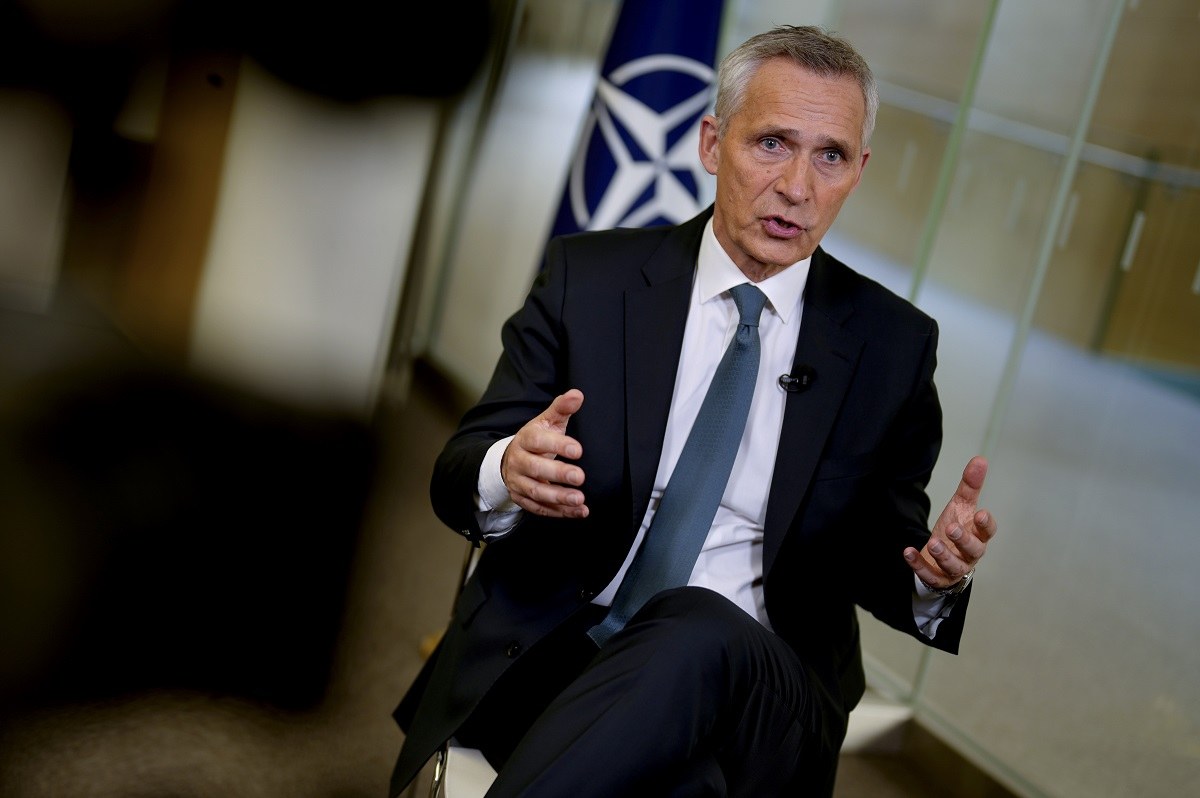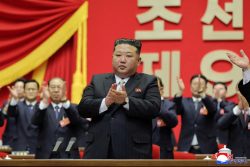NATO Wants to Fight Climate Change. Its Chief Tells AP the Trick Is to Make Armies Green but Strong

NATO Secretary General Jens Stoltenberg speaks during an interview at NATO headquarters in Brussels, Wednesday, June 21, 2023.
11:04 JST, June 22, 2023
BRUSSELS (AP) — NATO faces a series of dilemmas in its attempts to fight climate change while ensuring the effectiveness of its combat forces, as Europe’s biggest land war in decades ravages Ukraine, the head of the military alliance told The Associated Press in an interview on Wednesday.
The world’s armed forces are among the greatest consumers of hydrocarbons – fuel and oil – that contribute to greenhouse gases. They have been in much demand recently as global warming fans conflicts and crises because of resource and food scarcity.
The main dilemma NATO is contending with, Secretary-General Jens Stoltenberg said, is the difficult choice “between either having a green or a strong military.”
He said that NATO needs to “reconcile the need for an effective, strong, armed forces with the need to have climate-friendly armed forces.”
Last year, in its new Strategic Concept – essentially NATO’s mission statement – the world’s biggest security organization recognized, for the first time, climate change as “a defining challenge of our time, with a profound impact on Allied security.”
The document acknowledged that the 31-nation alliance’s “infrastructure, assets and bases are vulnerable to its effects.” It warned that NATO armies are being forced to operate in more extreme climate conditions and are increasingly called upon to take part in disaster relief operations.
“Climate change is a crisis multiplier. It increases competition over scarce resources like water and land, and it drives millions of people to leave their country. So, all this impacts our security,” Stoltenberg told the AP at NATO’s headquarters in Brussels.
Last week, NATO began an air deployment exercise in Germany billed as the biggest in the alliance’s history. Some 250 aircraft – a major source of emissions – from 25 nations responded to a simulated attack on a NATO member. The United States alone sent about 100 aircraft.
The exercise was long-planned, but remains part of NATO’s deterrence and defense strategy; its ongoing effort to dissuade Russian President Vladimir Putin from expanding his war against Ukraine to any member of the alliance. Wargames are not likely to be halted.
Stoltenberg said that the best way to achieve a balance is “to develop technology and to ensure that the armed forces are part of the energy transition which is going on.” NATO has established an “innovation fund” and a center for excellence on climate change to help develop such technology.
The United Kingdom has also begun to use more climate-friendly fuels, biofuels, for some of its aircraft. Other allies are working on ways to reduce their dependency on diesel, which is also particularly vulnerable to air or land attacks when being transported.
But Stoltenberg said that NATO cannot simply “go 100% from fossil technologies to zero-emission technologies in one stroke.” That raises another dilemma.
“Over time we will have parallel systems that will increase costs and there will be additional problems with logistics,” when it comes to supplying motors, battle tanks and ships with different kinds of fuels and parts, he said.
“The other dilemma (is) to make sure that the systems can work together,” Stoltenberg said. “If different nations (use) different systems that are partly fossil and partly new technologies, then the issue of the interchangeability and interoperability will be even harder.”
The fight against climate change has, in some ways, been postponed by the heavy reliance of many European countries on Russia for oil and natural gas before it invaded Ukraine last year. Some, like Poland, are slowing their transition away from coal, while others, such as Belgium, plan to keep using nuclear energy for longer.
Stoltenberg warned that nations must be wary of creating new dependencies, notably on authoritarian countries like China, for rare earth minerals like lithium and cobalt used in the manufacture of batteries and solar panels and windmills.
Security though is at the heart of the battle against climate change, Stoltenberg told the AP, and peace is a precondition for that, whether in Ukraine or elsewhere.
We need peace and stability, he said, so countries can cooperate among themselves and incur a meaningful global effort to reduce emissions.
“If allies or Ukraine were forced to choose between a climate-friendly or an effective armed force, then everyone would choose a strong and effective military because that’s about our security,” he said. The challenge, Stoltenberg underlined “is to reconcile, those two goals in the long run.”
Top Articles in News Services
-

Survey Shows False Election Info Perceived as True
-

Prudential Life Expected to Face Inspection over Fraud
-

Hong Kong Ex-Publisher Jimmy Lai’s Sentence Raises International Outcry as China Defends It
-

Japan’s Nikkei Stock Average Touches 58,000 as Yen, Jgbs Rally on Election Fallout (UPDATE 1)
-

Japan’s Nikkei Stock Average Falls as US-Iran Tensions Unsettle Investors (UPDATE 1)
JN ACCESS RANKING
-

Japan PM Takaichi’s Cabinet Resigns en Masse
-

Japan Institute to Use Domestic Commercial Optical Lattice Clock to Set Japan Standard Time
-

Israeli Ambassador to Japan Speaks about Japan’s Role in the Reconstruction of Gaza
-

Man Infected with Measles Reportedly Dined at Restaurant in Tokyo Station
-

Videos Plagiarized, Reposted with False Subtitles Claiming ‘Ryukyu Belongs to China’; Anti-China False Information Also Posted in Japan























